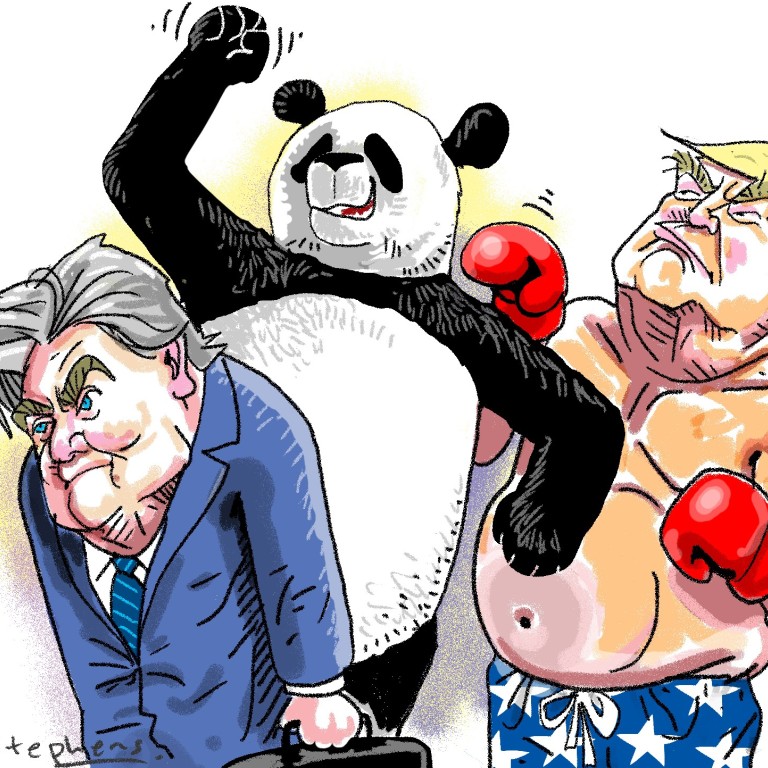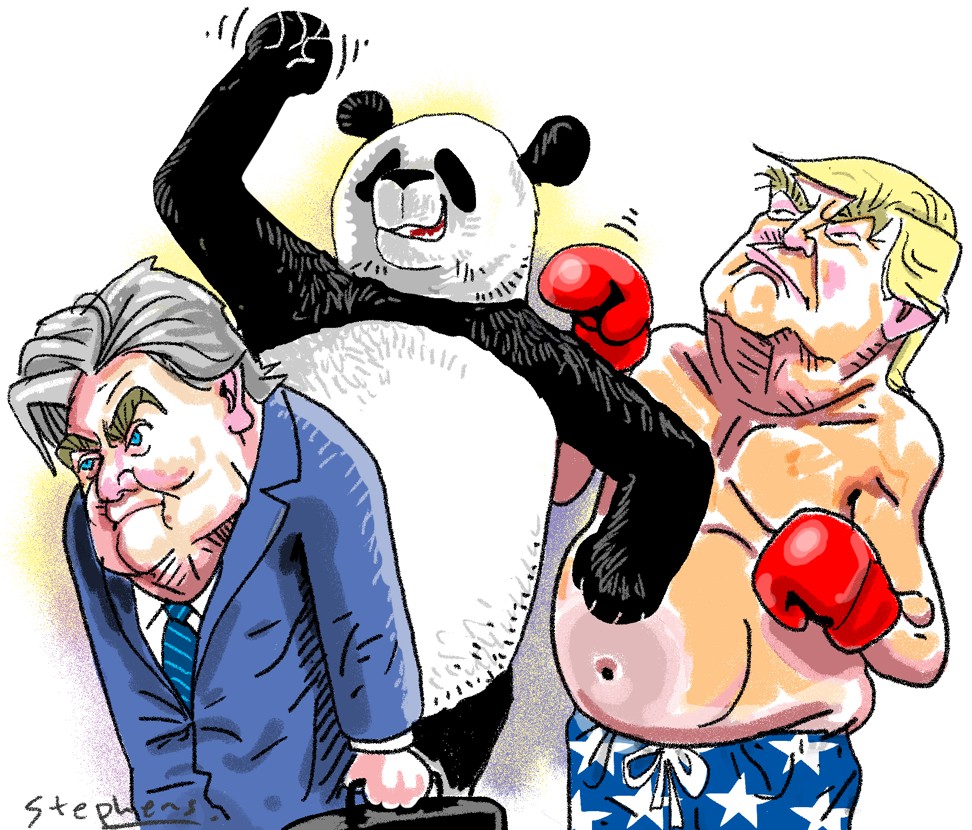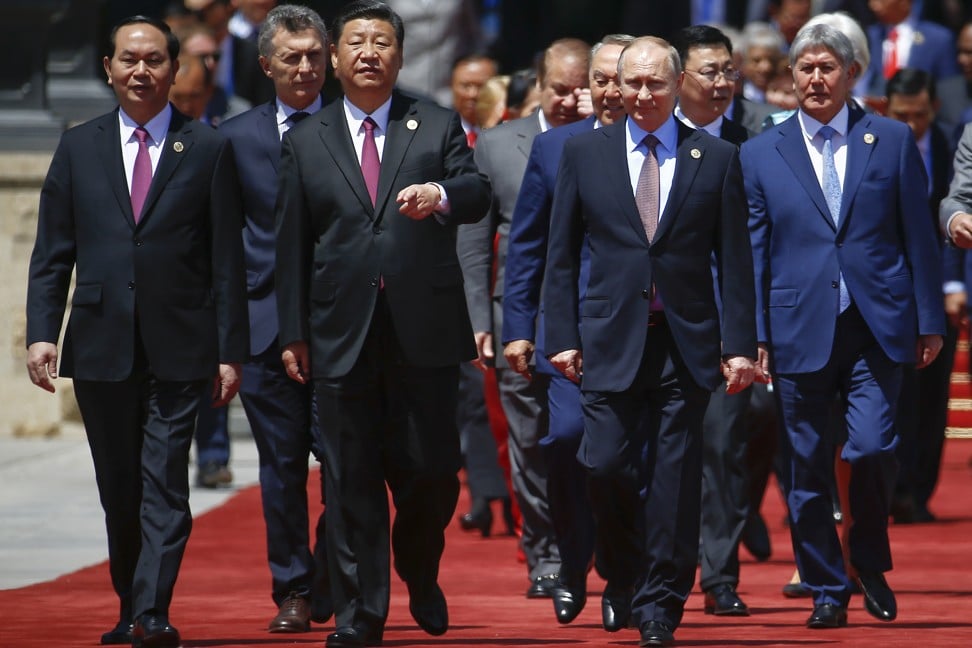
Why China should mourn, not cheer, the exit of Steve Bannon and Trump’s ‘America first’ policy
Zhang Baohui says the isolationism of the Trump-Bannon team left a leadership void that saw China rise to the occasion. But with US establishment-types now likely to be pushing for global primacy, prime rival China is sure to feel the heat

In the interview, Bannon claimed: “The economic war with China is everything. And we have to be maniacally focused on that. If we continue to lose it, we’re five years away, I think, 10 years at most, of hitting an inflection point from which we’ll never be able to recover.”
Watch: US engaged in ‘economic war’ with China
With a trade war looming, Bannon’s surprise resignation last Friday should be welcomed by the Chinese. After all, he is the chief architect of Trump’s nationalist economic strategy. The Chinese elation was reflected in a Global Times editorial on August 19, titled, “Bannon’s China Agenda should leave the White House”.
But does Bannon’s departure promise smoother relations? China’s elation may turn out to be ill-justified. The reality is that a likely demise of the “America first” doctrine, championed by nationalists like Bannon, may also see the United States returning to a realist posture in international relations. If so, it may well resume its global strategic rivalry with China.
Bannon may be gone, but tensions between the US and China will linger
In fact, they were believers in the “imperial overstretch” theory, devised by renowned historian Paul Kennedy, which says that great powers’ quest for global dominance results in their own domestic decay and long-term decline.
Bannon and Trump thus proposed “America first” to reorient the US, arguing that the country had to first address its shaky domestic economy and rebuild collapsing infrastructure. To do so, it needed to reduce global obligations.
‘America First’ can mean ‘America Alone’
This is in contrast to the zero-sum nature of the Sino-US power rivalry. Indeed, China has used deft diplomacy to manage the impact of the twin issues on bilateral relations. By promising harsher sanctions against North Korea and trade concessions, President Xi Jinping achieved a rather amicable Florida summit meeting with Trump in April, when the pair were able to build a good personal relationship. By eschewing primacy, the “America first” doctrine has thus actually facilitated Sino-US cooperation.
Watch: Xi Jinping makes a case for globalisation at Davos
How does China’s ‘One Belt, One Road’ match up against the TPP?
In barely six months, China has successfully positioned itself as an equal of the US in world affairs. Indeed, many countries have been urging China to exert greater leadership to fill the void. The result is that China is now being perceived as an organiser of global governance and a provider of global public goods.
Therefore, China has ironically benefited from the “America first” doctrine. Bannon and Trump’s neo-isolationism has indeed accelerated China’s rise; since they came to the White House, China has accomplished more for its long-held ambition to be a world leader than ever before.
Bannon’s departure and the likely demise of “America first”, therefore, do not bode well for China. It is obvious that the establishment-types are regaining control over US foreign and security policies. Trump, while still showing influences of “America first”, is likely to be swayed over time by traditional foreign and security pundits who now control key positions.
If so, “America first” and its neo-isolationism may turn out to have been a brief aberration amid the long-standing realist roots of US foreign policy. This could imply a return to the traditional US grand strategy that values global primacy.

Therefore, Bannon’s exit will not promise smoother relations. While the establishment-types in the Trump administration may not pursue a full-scale trade war with China, they may embrace once again a realist mindset that sees power rivalry as essential for international relations, and inevitably treats China as the biggest challenger. A similar mindset after the second world war resulted in the cold war with the Soviet Union.
Beijing’s cheering of Bannon’s resignation is thus ill-founded. What lies ahead may be a return to normality, that is, renewed attempts by America to preserve its global primacy. China may once again bear the full brunt of US power and will, to prevent it from emerging as America’s equal.
Zhang Baohui is professor of political science and director of the Centre for Asian Pacific Studies at Lingnan University in Hong Kong. He is the author of China’s Assertive Nuclear Posture: State Security in an Anarchic International Order

